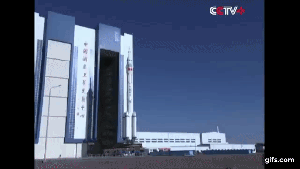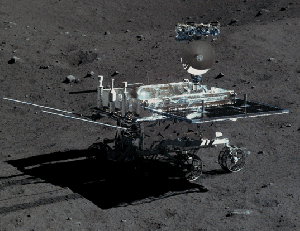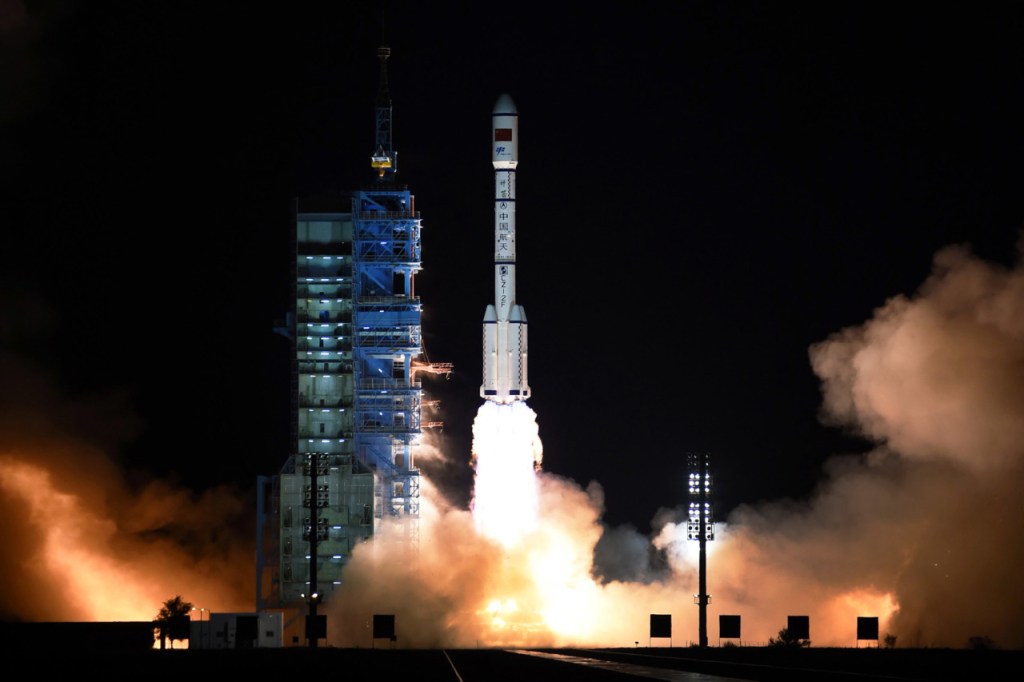Two taikonauts (Chinese astronauts) have docked to the Chinese space station, Tiangong-2, kicking off the nation’s longest human spaceflight mission to date.
Watch LIVE: #Shenzhou11 and #Tiangong2 set for orbital docking #Today at 19:30UTC https://t.co/6LJ8qJnY0O cc: @Astroguyz pic.twitter.com/hOsiWR3BWX
— Massimo (@Rainmaker1973) October 18, 2016
Over the course of 30 days, which is double the length of China’s next longest spaceflight mission, the taikonaut pair will carry out various science experiments as well as on-orbit repair tasks.
With their concerted effort to expand human spaceflight capabilities, China is quickly establishing dominance as one of the leading spacefaring nations in the world.
Late Sunday eastern time, two male taikonauts, Jing Haipeng and Chen Dong, launched in a Shenzhou-11 capsule on top of a Chinese Long March-2F rocket from the Gobi Desert. In two days’ time, Shenzhou-11 reached the Tiangong-2 station.

Tiangong-2 is the second space station in China’s Tiangong series and was placed in orbit just one month ago. The first space lab, Tiangong-1, was launched in 2011 and was used for two crewed missions, including China’s second longest crewed flight of 15 days with the Shenzhou-10 mission.
Tiangong-1 is now thought to be retired and expected to deorbit in the near future. A third, larger station, Tiangong-3, is expected to be sent to space in the 2020 time-frame.
All Tiangong labs are stand-alone space stations and are thought to be precursors for a larger space station that China will launch later in the 2020’s. Working to create a permanent human presence in space is just the latest milestone from the China National Space Administration.
China launched their first taikonaut in space in 2003. Since then, the country has steadily worked their way up to launching three-person crews on their own rockets while mastering spacewalks and orbital docking. In addition to their strides in human spaceflight, China has soft-landed a rover on the moon and has plans to send a rover to Mars.

But to be fair, these Tiangong spacelabs are teeny tiny compared to the International Space Station. Tiangong-1 and Tiangong-2 are each around 8 metric tons while the ISS is a whopping 400 metric tons. The larger space station that China plans to launch in the 2020’s is expected to be around 60 metric tons.
So why isn’t China working with the rest of the international community on this front and, instead, going it alone?
Well, the fact that NASA is legally prohibited from working with China is certainly a contributing factor. In 2011, Congress passed a bill with language prohibiting NASA from coordinating any joint scientific activity with China. This includes any activity on the ISS, which is why Chinese astronauts are not allowed on the space station.
Those laws, however, haven’t stifled China’s progress in developing key technologies required for human spaceflight including human-rated launch and landing capabilities, extravehicular activities (EVA’s) and on orbit docking maneuvers.
Now, of course if we must compare: the United States has held year-long crewed missions, has sent people to the moon, and has successfully landed multiple rovers on the surface of the moon and Mars. So NASA is still many years ahead of China in terms of spaceflight capabilities – both human and robotic. But, China isn’t too far behind and they certainly aren’t showing any signs of slowing down, or cutting funding to their space program, any time soon.
Today, taikonaut Jing Haipeng, age 50, will fly in space for the third time while taikonaut Chen Dong, age 38, will begin his first mission in space. Together, the two will complete an important step in China’s effort to study long-duration human spaceflight.
While the China National Space Administration is less vocal than other space agencies about their upcoming missions, some reports note at least one more crewed flight to Tiangong-2 is in the works. In 2017, another crewed mission, this one with three taikonauts, is expected to launch to the space station. The mission may be shorter than 30 days, but could possibly include a spacewalk.































Comment